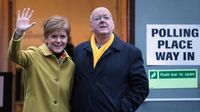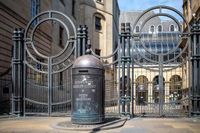In a dramatic and closely watched development, Peter Murrell, the former chief executive of the Scottish National Party (SNP), appeared in Edinburgh Sheriff Court on March 20, 2025, charged with embezzlement. This charge is part of the ongoing investigation known as Operation Branchform, which scrutinizes the party's financial dealings, particularly the handling of over £600,000 raised for a second independence referendum.
Murrell, 60, did not enter a plea during this private hearing and was granted bail pending further examination. The court proceedings come on the same day that his estranged partner, former First Minister Nicola Sturgeon, was officially cleared of any wrongdoing related to the probe. Sturgeon, 54, previously arrested in connection with the investigation, announced recently that she and Murrell had decided to separate.
Following her arrest in June 2023—subsequent to Murrell’s own arrest in April 2023—both Sturgeon and former SNP treasurer Colin Beattie, who was also detained during the investigation, have been cleared and are no longer under suspicion.
According to Police Scotland, the inquiry, which began in May 2021, had focused on how funds obtained through a referendum appeal were utilized, particularly as the SNP's accounts showed a shocking discrepancy: less than £100,000 in the bank despite receiving significant donations. As the investigation progressed, it concluded that there were no charges to be laid against Sturgeon or Beattie.
In providing updates about Murrell's case, the Crown Office and Procurator Fiscal Service emphasized that professional prosecutors are handling these matters independent of political interference, ensuring the integrity of the legal process. Under the Contempt of Court Act, which protects the rights of accused individuals while upholding the justice system's transparency, caution has been advised against commentary on active cases, where disclosure of evidence or testimonies can incur serious legal ramifications.
The legitimacy of the funds raised for the SNP has been thrown into the spotlight due to the large sums donated following a public appeal for a second referendum, with the funds raised highlighting severe inconsistencies in the financial reporting of the party. The SNP was under steady pressure to account for the allocation of a substantial fund that attracted public scrutiny.
Murrell's initial arrest came on suspicion of several financial irregularities tied to the party’s operations. After weeks of probing, he was recharged in 2024 with embezzling party funds—an allegation that has brought the SNP’s financial practices and leadership under scrutiny.
During his court appearance, a spokesperson for the Crown Office and Procurator Fiscal Service remarked: “Where allegations are made against people or institutions in which the public have placed trust, it is the responsibility of the authorities to conduct a thorough investigation to determine if there is evidence that criminal conduct has occurred.” As noted, this case draws immense public interest, given Sturgeon’s prominence as a political leader in Scotland and the contentious nature of the allegations involved.
Moreover, the investigation highlights a significant chapter in Scotland’s ongoing political landscape, particularly in this charged climate around independence discussions and the role SNP leadership plays in shaping that narrative. The party’s governance and financial integrity will likely remain focal points as political observers await the final resolutions of these legal challenges.
As the inquiry develops, all parties involved continue to navigate a tumultuous period, raised by the tensions surrounding independence ambitions that are contentious within Scotland. Murrell's situation shows the complexities at play within the party, compounded by his marital separation from Sturgeon, which has emerged as a significant personal narrative against the backdrop of the legal proceedings.
In light of the proceedings, Sturgeon expressed through legal representation her intent to focus on her current and future commitments, hoping to distance herself from the past allegations. As for the financial discrepancies, there is an expectancy for increased transparency from the SNP in its handling of funds moving forward, and the public curiosity surrounding the program remains prevalent.
In closing, the implications of Murrell’s embezzlement charge, along with Sturgeon’s clearance of any involvement in the financial wrongdoing, frame a significant moment for the SNP as they brace for upcoming challenges both within the party and from the electorate. The ongoing scrutiny will likely bring transparency demands to the forefront of Scottish politics as this political drama unfolds.





